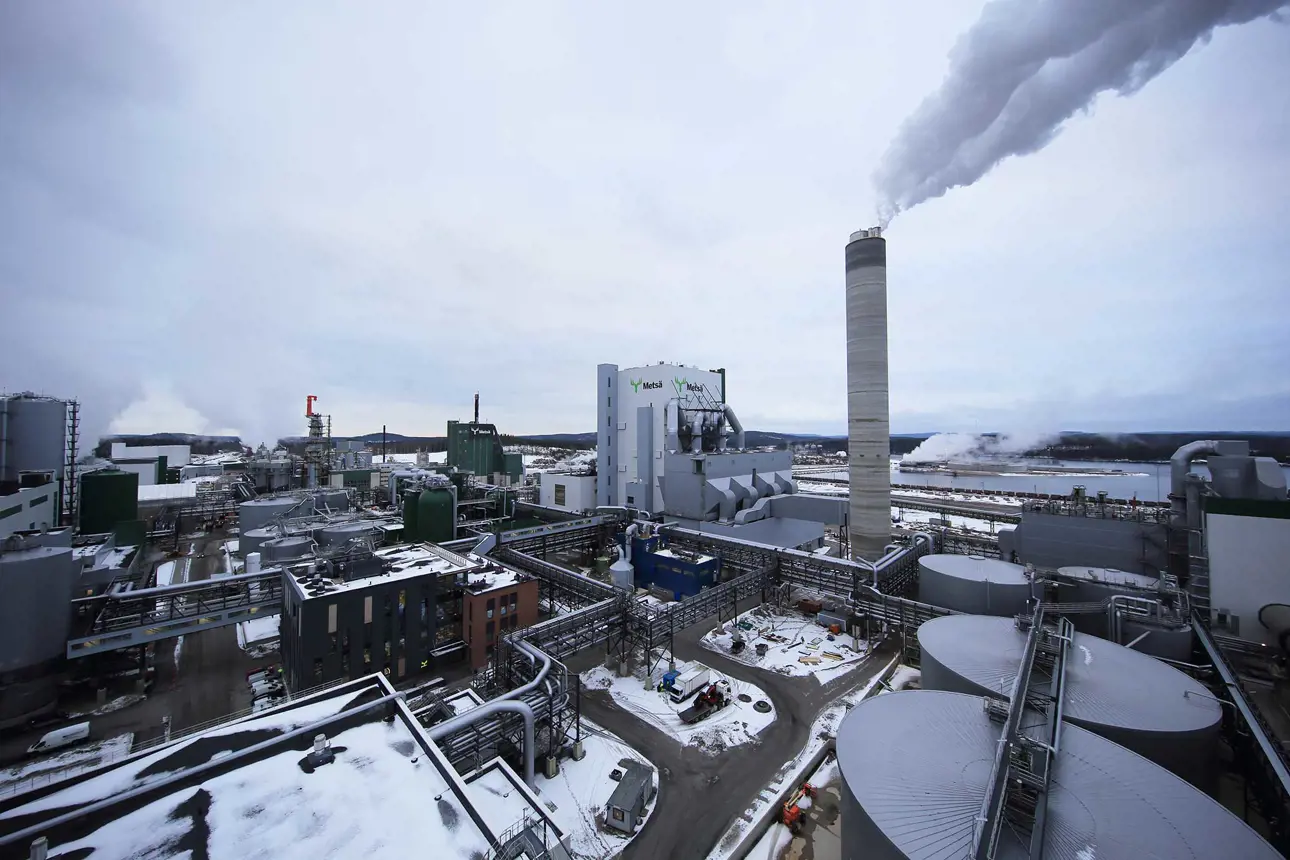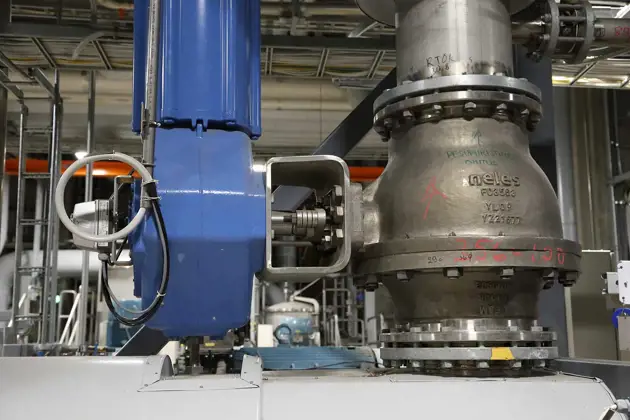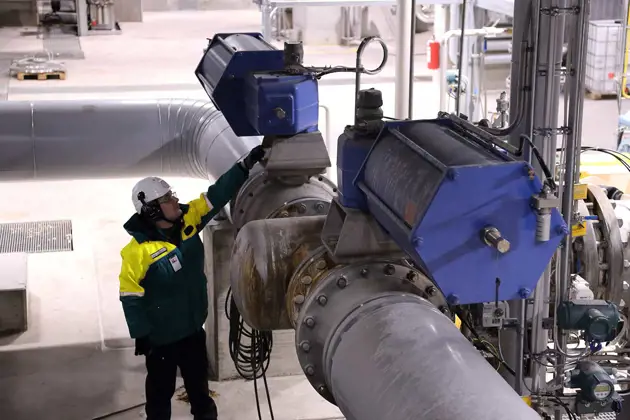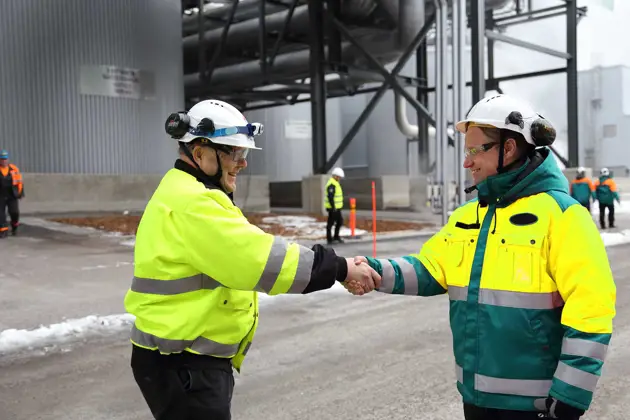Metsä Group’s bioproduct mill’s process flows under control with Valmet's optimized valve solutions and services
Feb 25, 2020
Operational reliability achieved at Metsä Group’s bioproduct mill

CHAPTER ONE Production efficiency and operational reliability with correctly selected valves
Neles’ (Valmet Flow Control business line as of April 2022) delivery is very comprehensive, covering more than 80% of the mill’s automation valves needed by various process departments. The full-scope maintenance, spare parts and service agreement supports the operational reliability of the mill’s production.
The customers of the Metsä Group’s bioproduct mill include companies manufacturing high-quality paper, paperboard and tissue paper. Along with high-quality pulp, it also produces a wide range of other bioproducts. Most of the pulp produced by the mill is exported, mainly to Europe and Asia. The biggest growth is in China. The bioproduct mill’s has a pulp production capacity of 1.3 million tons per year. The mill will reach its full production capacity approximately one year after start-up.
“Valmet has strong expertise in the sector. When the selection of valves is done carefully, it supports the reliable and environmentally efficient operations of the mill; it also ensures that the valves operate within the correct setting range,” notes Jouko Kotilainen, Project Manager, Electrification and Automation, Metsä Fibre.
When choosing the valve supplier, Metsä Group focused on sector expertise, reliability, and product quality. Additional selection criteria included the production location of the products and whether product development was part of the company’s operations. With such an extensive delivery, staying on budget and within the delivery timetable were also significant factors in the decision.
1.3 million tons
per year
CHAPTER TWO World-class environmental efficiency
One of the premises of the bioproduct mill planning was the 100% utilization of wood and production side streams. The bioproducts produced from the side streams – like bioenergy, tall oil and turpentine – account for about 20% of the mill’s turnover already in the first phase of the mill.
Environmental efficiency was also one of the cornerstones of the bioproduct mill’s planning and equipment selection decisions. The target already during the planning phase was for the new mill to operate within the emissions limits of the previous Äänekoski mill’s environmental permit and in compliance with the wastewater permit conditions even though its production capacity is nearly three times higher than the previous pulp mill.
“We have achieved the targets set for the mill’s environmental performance. Since the production volumes are almost three times bigger than that of the old mill, it means that we have closed the process water and chemical cycles more efficiently and to a greater extent than in the normal pulp process,” explains Timo Merikallio who headed the bioproduct mill project at Metsä Fibre.
One example of the closed chemical cycles is the sulfuric acid plant that produces sulfuric acid from the mill’s odorous gasses for the mill’s own use. “This has a big significance both in terms of environmental and economic performance. Having our own sulfuric acid production offsets some of the purchased chemicals – and therefore, e.g., sulfate emissions into waterways can be minimized.” Neles’ technology solutions can help the customer to meet environmental targets.
“The control accuracy of our valves is of high quality. The control valve’s positioner ensures that the valve is in the position it needs to be in different process phases and thereby ensures the correct flow volumes. Self-diagnostics ensure that the valve doesn’t malfunction; it operates reliably and thus contributes to the mill’s operational reliability and environmental performance,” says Marko Lindeman, Sales Director, Neles.

CHAPTER THREE Service agreement and competent personnel ensure uninterrupted production
A full-scope spare parts, maintenance and service agreement supports the operational reliability of the valves. “A service agreement is very important for a working mill. It ensures the availability of spare parts and human resources. We are able to plan our operations better when we know our partners and where we can get the needed spare parts on the agreed timetable,” Kotilainen says.
Neles’ Jämsänkoski regional maintenance service, headed by Service Supervisor Markus Oksjärvi, is responsible for the bioproduct mill’s maintenance services. “The local service we offer is very much valued among our customers. We are where the customer is, and we make sure that the customer’s production process is operating in an optimal manner,” says Lindeman.

“The mill is in the start-up phase and will achieve its full nominal capacity in summer 2018. Like the other Metsä Group pulp mills, the bioproduct mill will also have a maintenance outage lasting about one week every year. But we and the suppliers are aiming to challenge this rhythm and to lengthen the maintenance intervals to, e.g., about 1.5 years,” notes Merikallio. In addition to the traditional metal ID plates, the bioproduct mill uses electronic NFC tags with an electronically stored valve position number.
“We worked with the customer when choosing the type of NFC tag and decided how it’s attached to the side of each valve and then delivered. The valve tags are read at the receiving point and are recorded directly into the product data system,” says Project Manager Sami Pelkonen. The data recorded in the NFC tag will enable, among other things, the service people in the field to display all the valve data and documents on a cell phone with one scan.
CHAPTER FOUR Project expertise and collaboration play a crucial role
Neles’ project expertise has been important in the collaboration. It includes putting together the right kind of project team, careful timetable planning, technical expertise, and clear project documentation. “In big project like this, information management and the quick response to customer questions is especially important. The collaboration with the customer was straightforward and good throughout the project. There were a lot of issues to be sorted out in the project, and we worked with the customer to find solutions for them,” Pelkonen sums up.
“With careful planning, we were also able to tackle the timetable pressures that have required flexibility and prioritization. Neles has provided the technical expertise for the material and valve selections. Neles has helped us significantly so that we get operationally reliable valve solutions for the mill,” says Jouko Kotilainen.
And there is still room for development: “In the future, the logistics functions that were agreed to in this project should be handled with shared data systems. This would facilitate delivery control and billing; this is a shared development target for us,” notes Kotilainen.
Facts Neles’ delivery covers more than 80% of all automation valves at the mill
- A total of about 3,000 valves with auxiliary devices.
- The delivery included Neles™ ball valves, and segment and butterfly valves for on-off and control applications, and Neldisc™ butterfly valves for manual on-off duty. Control valves are equipped with Neles™ ND9000 series valve controllers, capable of advanced performance follow-up and predictive maintenance planning.
- Full-scope maintenance and spare parts service agreements.
- Neles also ensures the correct timing of future maintenance needs of the mill’s valve installations by utilizing digital valve controller properties and product information management.
Metsä Group’s bioproduct mill
- Biggest investment in Finnish forest industry history: 1.2 billion euros.
- The total mill area is 40 hectares.
- Operating at full capacity, about 240 trucks and 70 railroad cars of wood per day arrive to the mill.
- The mill uses 6.5 million cubic meters of wood per year.
- Most of the wood used comes from sustainably managed forests in Finland. The origin of the wood raw material used at the mill is 100% traceable, and 90% is PEFC or FSC certified.
- The bioproduct mill replaced the pulp mill that was in operation since 1985 and was nearing the end of itslife cycle.
- Pulp has been produced in Äänekoski since 1937.


Bioproducts
- Softwood and birchwood pulp as well as traditional bioproducts, like tall oil and turpentine, and bioenergy in various forms.
- New bioproducts: Product gas, sulfuphuric acid, biogas and biopellets.
- Concepts in the development phase: Lignin products, textile fibers from pulp, biocomposites.
- The mill’s energy self-sufficiency rate is 240 percent. The mill’s electricity production accounts for 2.5% of Finland’s total electricity production.

Subscribe to our newsletter
Subscribe now to flow control newsletter and receive the latest insights directly to your email.
Subscribe